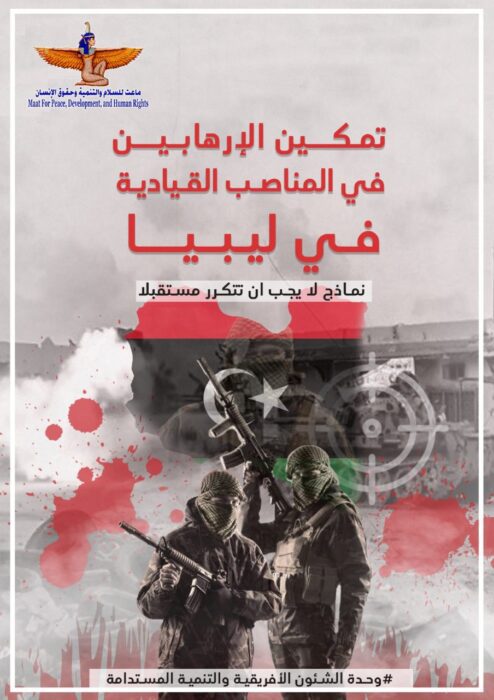Okeil: Turkey and the Government of National Accord (GNA) have violated the International Convention against the Recruitment, Use, Financing and Training of Mercenaries
Juda: We caution against the threats to the demographic structure of the Libyan society in light of the continued presence of mercenaries
On the sidelines of Maat for Peace, Development, and Human Rights participation in the activities of the 46th session of the Human Rights Council, Maat issued a report entitled: “Empowering Terrorists in Leadership Positions in Libya ... Scenarios to be Avoided in the Future.” The report pointed out several examples of mercenaries and terrorists who assumed Leadership roles in Libya under the rule of the Government of National Accord, aka Al-Wefaq government.
The human rights report affirmed that the mercenary problem has adversely contributed to the Libyan crisis that has been raging for over ten years now. It is also considered one of the root causes of the prolonged conflict, especially with the presence of internal parties and states providing logistical support and political cover for terrorists.
The report suggested that the Al-Wefaq government is involved in the political empowerment of mercenaries and terrorists through several measures, including the naturalization of a number of foreign mercenaries, paving the way for them to be part of the political future of Libya. It also indicated that Turkey recruits these mercenaries to either use them in proxy fights or to use them as a bargaining chip in defining Lybia's Future.
For his part, Ayman Okeil, president of Maat for Peace, Development and Human Rights, said that the peculiar coincidence of the suspension of the return of Syrian mercenaries with the decision of the Turkish parliament to extend the deployment of the Turkish military troops in Libya is another evidence affirming Turkey's involvement in supporting mercenaries. Okeil further added that the political empowerment of mercenaries, as is the case with Turkey and the GNA, contravenes all international conventions and treaties, topped by the “International Convention against the Recruitment, Use, Financing and Training of Mercenaries,” which makes it imperative for the countries of the world to take the necessary measures to detect perpetrators and hold them accountable for involvement in supporting terrorist mercenaries and assisting them.
In the same context, Abdul Latif Juda, a researcher at the African Affairs and Sustainable Development Unit, pointed out that both internal and international parties supporting terrorists and mercenaries should be identified and exposed before local and international public opinion. The researcher stressed the need to identify and expose those parties; otherwise, the same scenario would happen again in the future. Besides, this jeopardizes the demographic structure of the Libyan society and turns it into a conflict zone in the Arab region. In this light, Juda affirmed that the countries loyal to Libya, especially the neighboring ones, must intensify military support and build administrative and political expertise to confront these mercenaries and terrorists.
Maat is deeply concerned about Africa and Lybia because it serves as a member organization of the Economic, Social, and Cultural Council of the African Union (ECOSOCC), and as a monitor in the African Commission on Human and Peoples' Rights. Maat is also the North Africa Coordinator for the NGO Major Group for Africa affiliated to the UN high-level political forum.
To get a copy of the report, please complete the following form
shortlink: https://maatpeace.org/en/?p=32163












